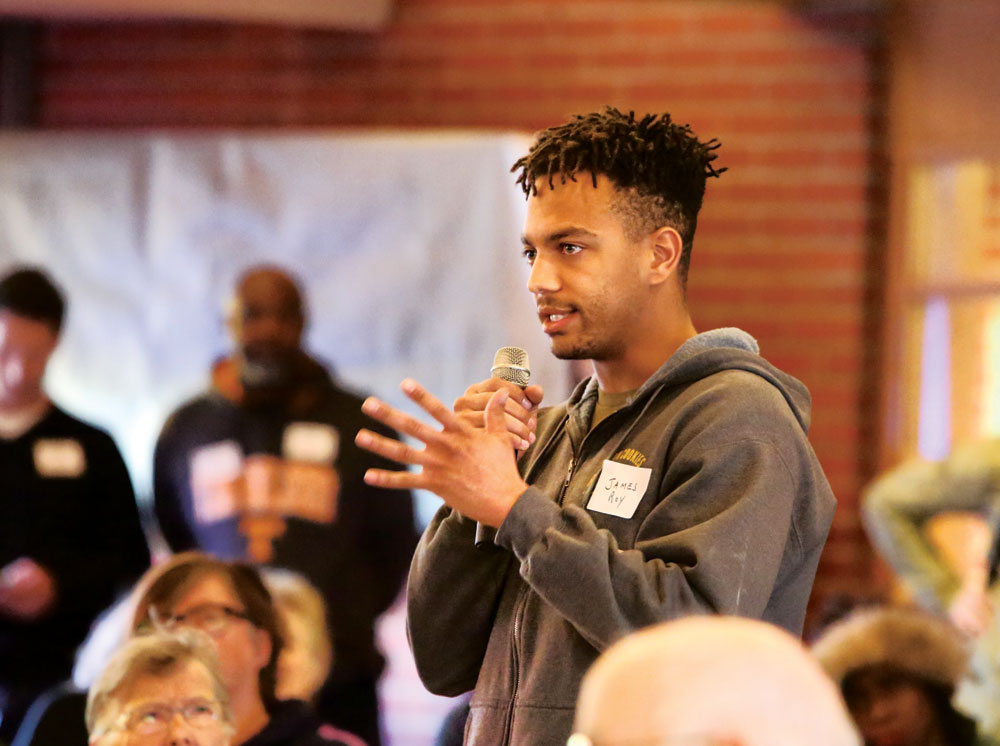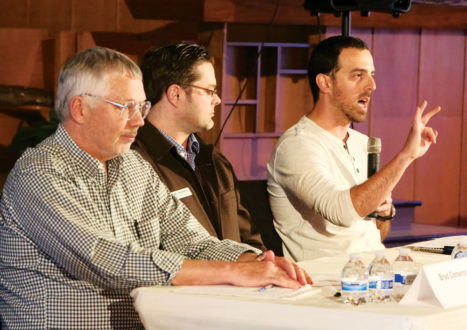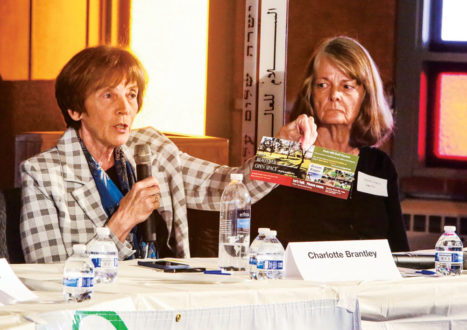
People tend to pick a side and stick to it, commented James Roy. “Now we need to come to the middle…My question is why has this panel and event undermined a community process that has been more diverse than this.”
A standing-room-only crowd filled the sanctuary at Park Hill United Congregational Church on Saturday afternoon March 10. The “informational forum” billed as “The Future of Open Space in Denver” attracted citizens concerned about how the 155 acres of prime land that is now Park Hill golf course should be used if Arcis, the golf course lessee, doesn’t renew their lease (which will be known by July 1).
The land is in a trust that has a fiduciary responsibility to fund Clayton Early Learning Center, which provides programs and services for low-income children. Whatever future use the land has, it must meet that legal obligation.

Panelists at the forum on the future of the golf course, from left, Brad Cameron, INC; Kevin Doyle and Jeff Romeo, are nearby homeowners.
The forum was planned by Interneighborhood Cooperation (INC), whose mission is to bring together neighborhood organizations to actively engage in addressing city issues. INC has taken a position that this is a “once in a lifetime opportunity for the city to purchase a huge amount of land in Denver that could serve as a regional park.” They believe that the city needs to come up with enough money to meet the needs of the Clayton trust and purchase the land for a park. The panel, besides the Clayton representative, Charlotte Brantley, had four other members, all of whom spoke strongly in favor of using the land primarily for golf or parks/open space.
Attendees with views that differed from those of the panelists raised the following concerns: “How is it that you don’t have any representation on this panel from the African American community?” “How is building a regional park to which people must drive more responsible than building a walkable neighborhood?” The imam of the NE Denver Islamic Center, located less than half a block from the golf course, said Park Hill is a food desert and that needs to be addressed.
“The fact that this meeting was called and billed as about open space has maybe not attracted a representative audience about the concerns that exist in the community around gentrification and displacement in this neighborhood.”
Speakers supporting use as a park also brought up additional issues: One person said the prior community meetings had been too focused on cost trade-offs and a meeting was needed to primarily focus on Denver’s need for more parkland. Another person raised the question whether citizens are being appropriately represented in the city’s dealings with Clayton because Mayor Hancock’s campaign chair was from the same law firm as the one representing Clayton. A city attorney in attendance pointed out that city attorneys are representing Denver in the discussions with Clayton.

Panelists Charlotte Brantley (left), Clayton Early Learning and Kathleen Wells (right), Citizens’ Climate Lobby. Brantley spoke about mixed use; the other panelists strongly favored continued golf course or park use.
Brantley and several of the attendees pointed out that this decision is not either park land or development—with 155 acres it can be both. (See Civic Meetings on page 21 for an upcoming community meeting to discuss the future of Park Hill Golf course land.)
The city was invited to the panel but did not attend. The Front Porch contacted Evan Dreyer, deputy chief of staff in the mayor’s office, who said it’s not appropriate for the city to discuss future use of the golf course land until it is known whether the lessee will renew. He reiterated that Clayton has a financial, legal and fiduciary responsibility to the kids and that is their priority. And he said the city is hearing two things from the community: both a strong desire for continued golf or park/open space use and interest in affordable housing and community-serving retail. He also confirmed that if Arcis acts on their first right of refusal to purchase the land, the only thing they can do with the land is use it as a golf course.



I like the comment some else have already have said, “What did you think they were going to do with the land” Build flood migration improvements?